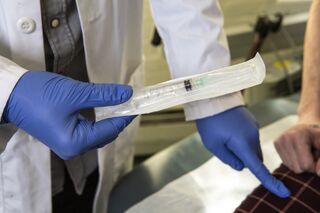Transgender
A Bright Future for Transgender Medicine
Biomedical researchers seek to understand gender-affirming care.
Posted December 14, 2021 Reviewed by Michelle Quirk
Key points
- Data from mouse research suggests the impact of testosterone treatment on ovaries is not permanent.
- Researchers found that oocytes taken from mice during testosterone treatment are fertilizable.
- Future research promises to improve and expand gender-affirming care.

The concept of using scientific research to benefit the nearly 1.2 million transgender individuals in the United States has historically focused on the question “What makes someone transgender?” However, biomedical researchers have started to ask “How can science benefit transgender lives?” and are developing novel techniques to answer this.
Hadrian Kinnear describes the goals of this new field after presenting research on reproduction in a mouse model of gender-affirming hormone therapy:
At its best, Trans Science would not question the importance of gender-affirming care nor threaten access to such care. It would instead look to more deeply understand the influence of gender-affirming hormones and surgeries on physiology so as to improve upon current treatment options and provide decisional context to trans people and their providers.
Current recommendations guiding medical decisions for transgender reproductive health rely exclusively on clinical data collected from individual patients. However, this is no replacement for the controlled studies required to provide accurate and effective care. Given gender-affirming hormone therapy is medically necessary for some, taking advantage of a rodent model allowed Kinnear to perform controlled experimental manipulations, not ethical for work in humans. Data from such controlled studies are a powerful alternative to relying on clinical data alone.
Effects of Testosterone Therapy on Mouse Ovaries
By mimicking the hormone therapy regimens commonly used in the trans community, Kinnear examined the impact of testosterone therapy on the ovaries of mice. The models’ value was established by showing data from testosterone-treated mice matched clinical outcomes of transgender individuals on testosterone therapy.1 The group, led by Drs. Moravek, Shikanov and Padmanabhan at the University of Michigan, then found some effects of testosterone on reproduction can be reversed by pausing treatment.2 Such information is critical to ensure trans individuals on testosterone therapy can make informed medical decisions regarding their reproductive health. For example, these data could help trans men who wish to be gestational parents and may pause testosterone therapy to safely do so.

Oocytes From Testosterone-Treated Mice
As translational research on gender-affirming hormone therapy grows, new labs and lines of inquiry will take the field in novel directions. Indeed, using a similar paradigm to the one developed at the University of Michigan, another group determined oocytes taken from mice during testosterone treatment are fertilizable.3 Examining this further may inform the decisions of trans men using assistive reproductive technologies like in-vitro fertilization.
Future Research
These studies are the launching point to understand, improve, and expand transgender medicine. It is exciting to guess where this research will lead us next — more translational models of gender-affirming care, new data to inform medical decisions, personalized therapies to recreate hormone cycles, novel methods of suppressing or enhancing hormone actions. Translational transgender research is a new field; the questions and possibilities are limitless.
References
1. Kinnear, H. M., Constance, E. S., David, A., Marsh, E. E., Padmanabhan, V., Shikanov, A., & Moravek, M. B. (2019). A mouse model to investigate the impact of testosterone therapy on reproduction in transgender men. Human Reproduction, 34(10), 2009-2017.
2. Kinnear, H.M., Hashim, P.H., Cruz, C.D., Rubenstein, G., Chang, F.L., Nimmagadda, L., Brunette, M.A., Padmanabhan, V., Shikanov, A. and Moravek, M.B., (2021). Reversibility of testosterone-induced acyclicity after testosterone cessation in a transgender mouse model. F&S Science, 2(2), 116–123.
3. Bartels, C. B., Uliasz, T. F., Lestz, L., & Mehlmann, L. M. (2021). Short-term testosterone use in female mice does not impair fertilizability of eggs: implications for the fertility care of transgender males. Human Reproduction, 36(1), 189–198.


